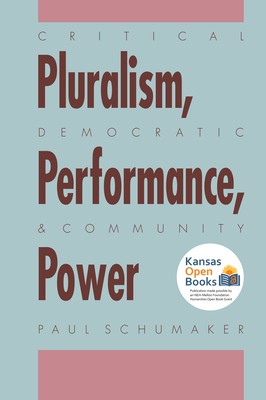
- We will send in 10–14 business days.
- Author: Paul Schumaker
- Publisher: University Press Of Kansas
- ISBN-10: 0700631682
- ISBN-13: 9780700631681
- Format: 15.2 x 22.9 x 1.5 cm, softcover
- Language: English
- SAVE -10% with code: EXTRA
Critical Pluralism, Democratic Performance, and Community Power (e-book) (used book) | bookbook.eu
Reviews
Description
A central question in political science is who governs and how.
Typically political scientists attempt to answer this question by relying upon either empirical analysis, which explains existing political practices, or normative analysis, which prescribes ideal political practices. Political scientist Paul Schumaker rejects this distinction between empirical and normative theory. Instead, he weds the two approaches to create the new analytical mode he calls critical pluralism. With it he can measure variances in government from pluralist/democratic ideals and still provide theoretical explanations of why the variances occurred. Schumaker uses critical pluralism to describe, explain, and evaluate variations in three key measures of democratic performance: responsible representation, complex equality, and principle-policy congruence. To test his framework and methodology he analyzes 29 community issues that arose in Lawrence, Kansas, between 1977 and 1987. The results of his study--one of the most comprehensive databases ever in the study of community politics--will be of interest to those who study community power. The conceptual framework itself and methodology used in assessing democratic performance will have a lasting impact on the way community government is studied.EXTRA 10 % discount with code: EXTRA
The promotion ends in 9d.04:14:03
The discount code is valid when purchasing from 10 €. Discounts do not stack.
- Author: Paul Schumaker
- Publisher: University Press Of Kansas
- ISBN-10: 0700631682
- ISBN-13: 9780700631681
- Format: 15.2 x 22.9 x 1.5 cm, softcover
- Language: English English
A central question in political science is who governs and how.
Typically political scientists attempt to answer this question by relying upon either empirical analysis, which explains existing political practices, or normative analysis, which prescribes ideal political practices. Political scientist Paul Schumaker rejects this distinction between empirical and normative theory. Instead, he weds the two approaches to create the new analytical mode he calls critical pluralism. With it he can measure variances in government from pluralist/democratic ideals and still provide theoretical explanations of why the variances occurred. Schumaker uses critical pluralism to describe, explain, and evaluate variations in three key measures of democratic performance: responsible representation, complex equality, and principle-policy congruence. To test his framework and methodology he analyzes 29 community issues that arose in Lawrence, Kansas, between 1977 and 1987. The results of his study--one of the most comprehensive databases ever in the study of community politics--will be of interest to those who study community power. The conceptual framework itself and methodology used in assessing democratic performance will have a lasting impact on the way community government is studied.

Reviews